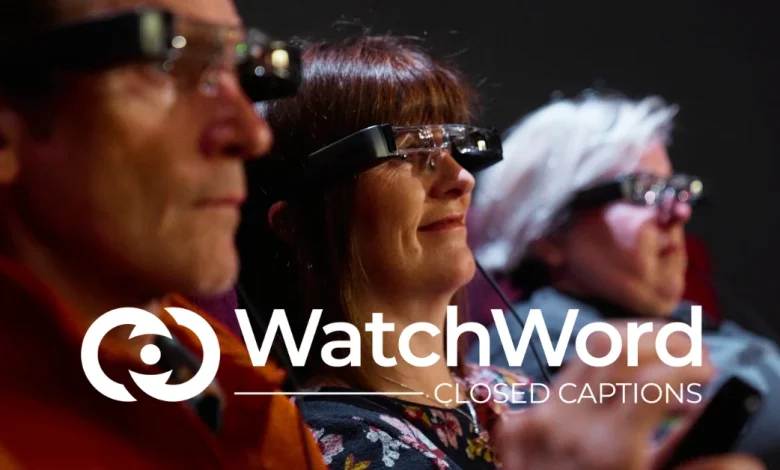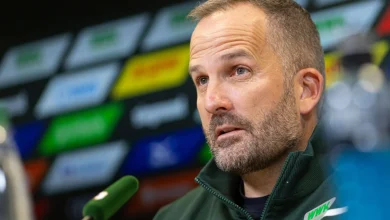WatchWord: Closed-caption Glasses Transform Cinema Experience for Deaf Community

Even with the advent of captions, a trip to the cinema for anyone who is part of the hearing-impaired community can be a very restrictive experience. Captions – which not only include all spoken dialogue, but written descriptions of sound effects, music and even emotions – can be delivered in two ways, open or closed. “When captions are open, everyone can see them on the screen, and when they’re closed, it generally means they’re on some kind of device that is personal to the user,” explained Jonathan Suffolk, one of the co-founders of the UK’s East Midlands-based tech startup, Built For Good.
The trouble is, both open and closed caption delivery systems come with flaws. Open captions screenings, of course, can be experienced by everybody. But such screenings are still not widely available to the public. “No matter what people who don’t have hearing needs say about open captions, and to what extent they’d be prepared to watch a film with an open caption track, they don’t back it up when they book. It’s an uncomfortable truth,” said Suffolk. As they’re traditionally the least well-attended screenings in cinema schedules, that just means one thing. “They’re often scheduled at rather awkward times.”
If that makes it difficult for those with hearing difficulties to attend, the closed caption option also lacks appeal. In the past, closed captions were sent to a mobile phone-like device, an experience that forces the user to glance between a screen in the palm of one’s hand and the actual screen they’ve bought a ticket to see. “It’s not an ideal experience,” said Suffolk, whose company Built For Good has one primary aim: to make places of entertainment and the arts more accessible to deaf and hard of hearing people.
The rather elegant solution, developed by Built For Good in partnership with others, comes in the shape of augmented reality glasses. Called WatchWord, these cutting-edge smart glasses stream the caption track wirelessly to the lenses of the glasses, appearing in front of the eyes of the user. The lightweight ergonomic design takes into account those who wear hearing aids, cochlear implant processors or reading glasses, and can be comfortably slipped over any of the above. If you turn your head from the screen, the captions turn with you.
The basic technology is nothing new, of course. “Augmented reality glasses have existed for a long time, but no one’s known what to do with them,” said Suffolk. “There were subsequently quite a few uses for them, including medical services and remote engineering.” But the use of this technology in the arts in the UK began back in 2016, when Stagetext, a deaf-led charity, won funding to conduct research with the University of Roehampton, London. At the time, Suffolk was heading up the sound and video department at London’s National Theatre, which invited Stagetext to use a temporary theatre built on the South Bank, called The Shed, as a research space.
The WatchWord glasses and handset (image: Built For Good)
“They were actually studying eye movements to establish what proportion of the time [audiences] were looking at the performance and what proportion of the time they were looking at the phone,” Suffolk explained. “In this case, it was for a piece of theatre. And surprisingly, it was 50/50. We invited them in at the time because I’d been tasked with trying to establish whether or not there are better ways of serving captions to people in theatre.” By 2017, a year-long pilot was launched for Smart Caption Glasses – developed by tech company Epson – at the National Theatre, which proved a resounding success. “It’s been running at the National Theater ever since.”
Building Built For Good
After Suffolk left the National, he joined forces with Tabitha Allum, former Stagetext CEO, and Tim Middleton, a colleague at the National who worked in the sound team, to create Built For Good in 2020. Again working with Epson, the company developed two strands: WatchWord for cinemas and WatchWord Live for stage performances. Technology for the latter is already in use in two theatres in the United States and was recently trialed at the UK’s Chichester Festival Theatre.
Trials for WatchWord began at the QUAD cinema in Derby, followed by Chesterfield’s Cineworld and the Odeon cinema at Milton Keynes Stadium. The results were game-changing for the deaf and hard of hearing communities, opening the cinema experience up to them and creating a far more inclusive experience. “This offers a technology that allows people who have hearing needs and who need captions to sit beside people who don’t have hearing needs and perhaps don’t want to watch captions so they can enjoy a film together,” said Suffolk.
The WatchWord system benefits from being extremely intuitive. When you attend a screening, along with the glasses, you’re given a small handheld device which allows you to adjust the text. “We’ve tried to make it user friendly… because you don’t want to be faffing around too much when you’re sitting down in a dark room getting ready to watch a film,” said Suffolk. “You can change the colour, you can change the size, you can change the position, you can change the focal depth.” And a clever feature of the handheld control is that it can even be hung around the user’s neck, ensuring it doesn’t get lost in the dark of the cinema.
The BFI Southbank has already installed WatchWord, and the recent London Film Festival, which also deploys open caption screenings, has made the technology available for the third year running. The big shift will be rolling it out across the country and beyond, with the onus on the exhibitor – who must pay an annual licence fee to use WatchWord – to procure the system.
A Symbiotic Partnership
A big step forward for Built For Good was that it recently entered into an accessibility partnership with the Odeon Cinemas Group to introduce the technology in 14 cinemas across the UK with the support of Universal Pictures, as the first phase of a wider rollout. The service will be available, free of charge, starting with the upcoming 21st November release of Universal Pictures’ much-anticipated “Wicked: For Good.” Ariana Grande and Cynthia Erivo, the film’s stars, are even fronting a promotional drive. “Everyone at Universal, and everyone at Odeon is absolutely sold on the idea of landing this and making it work,” said Suffolk. “Built For Good is the name of our company. “Wicked: For Good” is the name of the film. It felt perfect. And I think that’s what really sparked at Universal, going, ‘How about this? Let’s see if we can make it work.’”
Built For Good technology is launching its WatchWord closed-caption smart glasses at 14 Odeon cinemas across the UK for the launch of Universal’s “Wicked: For Good” on November 21st
Suffolk pays tribute to Demir Yavuz, VP International Film Operations at Universal Pictures, whose enthusiasm for the project has been instrumental in driving the partnership. “He was just sold on the idea.” As Yavuz has stated: “The smart glasses closed caption system WatchWord has created is nothing short of a miracle, further opening the world of cinema to the d/Deaf, deafened and hard of hearing audience.” By January 1st, 2026, the rollout will expand to “all films and all showtimes from all distributors in participating cinemas”, as the press release states.
The good news is, for the 12 million-plus people in the UK who are hearing-impaired, the price of using the WatchWord glasses will not be passed onto the consumer via inflated ticket prices. After all, exhibitors are always looking to foster repeat business, and creating a more inclusive cinema-going environment should be a priority. “That’s particularly the case with independent cinemas, who have a really close relationship with their audiences,” commented Suffolk. “They provide the technology for free to allow people to have access.”
The Commercial Case and the Developing Technology
Adopting this technology should, in essence, be an economically sound move for exhibitors. “There’s a strong argument to be made for why it does make good business sense,” said Suffolk. “And I think when it makes more business sense is when someone who is hard of hearing or deaf goes along with people who aren’t, and they can all attend the same screening. Because previously, if you’ve been in a group and one of your group was hard of hearing or deaf, you might not have been able to go and do the things that you can now.”
While Suffolk believes there is room for improvement – suggesting the battery life of the Smart Glasses could be longer – the technology behind the glasses is ever-evolving. “They’re a lot lighter than the last iteration. The components are getting smaller all the time. And for a company like Epson, they’re taking a real punt with technology and I take my hat off to them. A lot of augmented reality technology has come and gone, and Epson have carried on going, and they’re very considered in the way that they try and find applications for the technology that they’re developing.”
Of course, the success of WatchWord may yet be hampered by the caption tracks themselves. “The creation of a caption track can be quite an expensive process. It’s the larger distributors, the larger studios, who provide them,” explained Suffolk. “Companies like Disney and Universal issue a caption DCP with a caption track on it. So it’s become more and more the norm.” Should WatchWord take off, and be adopted by further cinema chains, it’ll likely encourage smaller film companies to create caption tracks.
Early reviews for WatchWord have been largely positive, although Suffolk wants to make things clear. He doesn’t want this technology to replace open caption screenings. “Our aim is to augment what’s already offered by exhibitors. Our intention is absolutely not to take anything away. This is technology that fills a gap, not something that’s been designed to replace anything – because a lot of people in the deaf community absolutely love the experience of going to the cinema and having open captions. And we’re not getting in the way of that. We’re just giving people more choice, given the financial realities of the cinema industry… we’re trying to be as ethical as we possibly can be.”





